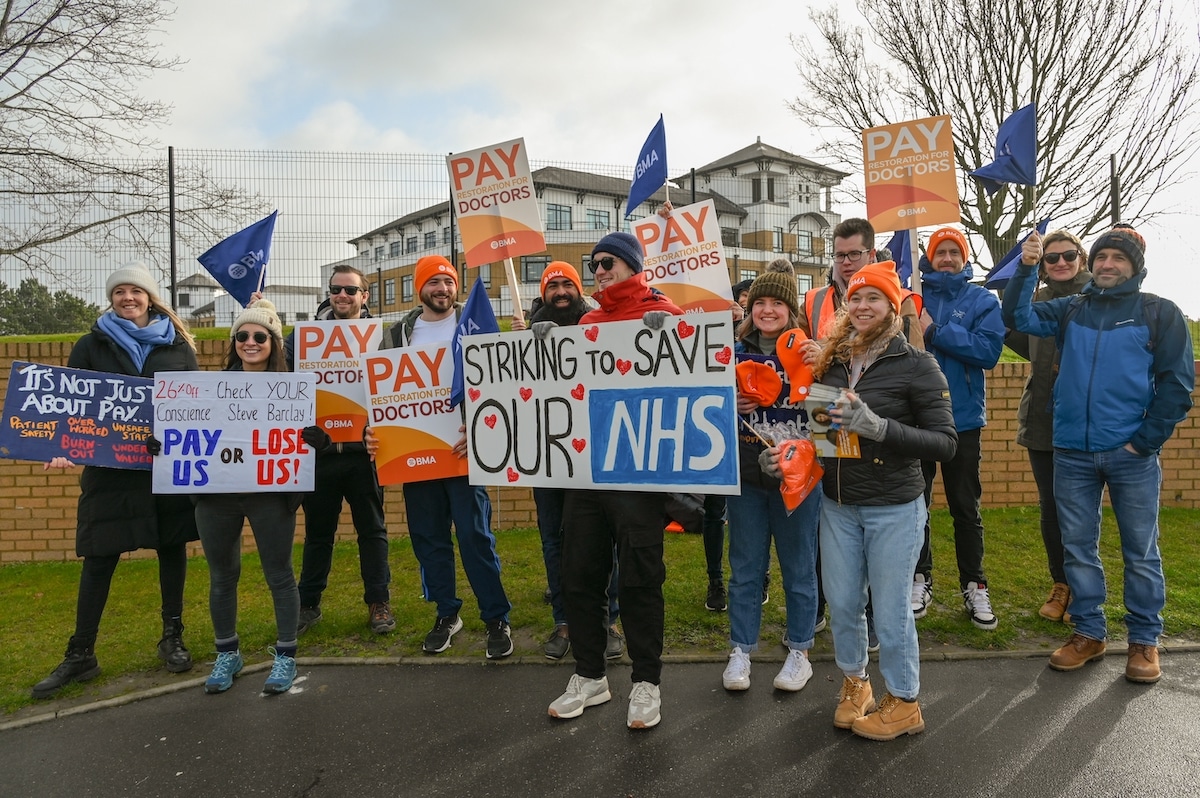Amidst the longest junior doctors’ strike in NHS history, a heated clash has ensued as the British Medical Association accuses NHS England chiefs of succumbing to political pressure. Here’s the full story.
BMA Allegations
The ongoing strike by junior doctors in the UK has taken a contentious turn, with the British Medical Association (BMA) accusing NHS England chiefs of undermining the industrial action. The BMA contends that the decision to call back striking doctors is influenced more by political pressure than genuine concerns for patient safety.
The doctors’ union, in a scathing critique, asserted that the process of recalling medics to the frontline during “extreme circumstances” is at risk of collapse due to a failure by health bosses to adhere to established protocols. According to the BMA, there is evidence of a departure from the usual practice, as some trusts have not provided necessary information about exhausting all alternative staffing options before requesting derogations.
In a letter addressed to NHS England Chief Amanda Pritchard, BMA Chair Prof Philip Banfield expressed the gravity of the situation, stating, “This refusal to provide the information necessary to take well-informed decisions is fundamentally undermining the derogation process as we are being asked to take decisions about our members’ right to strike without the requisite information.”
NHS England’s Defense
NHS England swiftly responded, defending local hospital chiefs and asserting that the requests to bring back doctors were genuine attempts to protect patients. It deemed the BMA’s attack “regrettable” and accused the union of casting doubt on the “integrity” of local clinical leaders, some of whom are likely BMA members.
Rishi Sunak also lent his support to the NHS, emphasizing the need to ensure patient care amid disruptive strikes. In response to the allegations, an NHS England spokesperson stated, “The NHS has a robust process in place for seeking derogations from the BMA to prioritize the safety of our patients and this has involved providing strong evidence where the most challenged systems need support.”
Longest Strike in NHS History
The ongoing strike, spanning 144 hours and set to end on January 9, marks the ninth time junior doctors have halted work since March of the previous year. This strike is the longest in the history of the NHS, founded in 1948, and comes amidst a challenging confluence of factors, including winter viruses and overcrowded hospitals.
The BMA and NHS England have traditionally agreed on derogations, allowing junior doctors to return to work in emergencies. However, the BMA alleges that some trusts have not provided evidence of exhausting all staffing alternatives before recalling striking medics, thus undermining the derogation process.
Banfield’s letter to Amanda Pritchard raised concerns about the motivations behind the change in NHS England’s approach, stating, “We are increasingly drawing the conclusion that NHS England’s change in attitude towards the process is not due to concerns around patient safety but due to political pressure to maintain a higher level of service, undermine our strike action and push the BMA into refusing an increasing number of requests.”
Extent of Derogation Requests
Approximately 25 derogation requests had been submitted to the BMA by NHS chiefs, seeking the return of doctors during the strike. The majority of these requests were rejected, with some still under consideration by the union. Critical incidents were declared in several trusts, citing extreme pressure and exceptionally busy conditions, including A&E waits of up to 11 hours.
Several BMA leaders echoed Banfield’s concerns. In response to the derogation requests, one BMA representative stated, “A number of local negotiating committee leaders have told us that their employers decided to apply for a derogation well in advance of strike action and before alternative solutions could be pursued.”
Highlighting the disconnect between frontline consultants and the derogation process, another BMA spokesperson revealed, “In addition, consultants on the frontline in several of the departments we have received requests from, have expressed surprise that a derogation request has been submitted, telling us they are staffed safely.”
Dr. Tim Cooksley, the immediate past president of the Society for Acute Medicine, added a grim forecast, warning of “significant harm and trauma” for NHS patients due to the ongoing strike, winter pressures, and a strained healthcare system. Patients could face degrading corridor care, prolonged ambulance waits, and significant harm due to delayed ambulance responses.
Looking Forward
As the strike continues, the clash between the BMA and NHS England intensifies, raising questions about the integrity of the derogation process and the impact of political pressure on healthcare decisions. The gravity of the situation cannot be understated, with both sides emphasizing the need for a nuanced approach that ensures patient safety while addressing the legitimate concerns of the healthcare workforce.
The longer-term repercussions of this conflict on the already stretched NHS system remain uncertain, while both sides seek to navigate the delicate balance between ensuring patient safety and addressing the legitimate concerns of the healthcare workforce.
The post NHS England Chiefs Under Pressure Over Handling of Doctors’ Strike first appeared on Edge Media.
Featured Image Credit: Shutterstock / Ajit Wick
Grant Gallacher is a seasoned writer with expertise in politics and impactful daily news. His work, deeply rooted in addressing issues that resonate with a wide audience, showcases an unwavering commitment to bringing forth the stories that matter. He is also known for satirical writing and stand up comedy.

